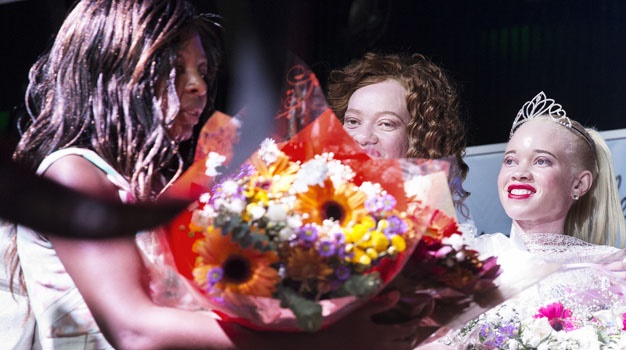
There are signs of hope and progress, with significantly more support being shown in society towards people with albinism than there was a decade ago, write UN experts Muluka Miti-Drummond and Ikponwosa Ero.
People with albinism have historically been discriminated against and mistreated in various ways, from schoolyard bullying and full-blown attacks to a violation of access to fundamental human rights like adequate healthcare and equal education. This prejudice continues, differing in nature and severity according to the ethnicity and location of the individual concerned.
The attitudinal barriers are worse in Africa, and this is due to stereotypes and misconceptions related to albinism being seen as a supernatural condition, with the body parts of the person believed to possess special powers to grant things like wealth or power. This has led to significant atrocities where victims are attacked and mutilated, which is ongoing in different locations in Africa.
The body parts are used in rituals and potions related to certain forms of so-called "witchcraft".
In Zambia, there were three reported attacks on children with albinism this year, an attempt in Democratic Republic of Congo, and a murder in Cameroon, where the remains of a 40-year-old man were found with his body parts missing.
Superstitions
Further to being dehumanised and commodified, people with albinism fall prey to a variety of superstitions – from the idea that the condition is contagious, to the notion that a pregnant woman will give birth to a baby with albinism if she comes into contact with such an individual, as just two examples.
As a result, there is much exclusion, and women who have children with albinism are treated in the same way, often accused of infidelity. Stigma extends worldwide against people with the condition for various reasons, with incidents of harassment occurring globally. The film industry has not helped either, in how they have negatively portrayed characters with albinism in the past.
Despite these events, there are signs of hope and progress, with significantly more support being shown in society towards people with albinism than there was a decade ago. Acceptance within the family is improving and there are more children seen in schools.
READ | Hlengiwe Mkhize: Hidden in plain sight: Persons with albinism fighting the odds every day
In addition to the basic rights to life, security of person and protection from racial discrimination based on colour and gender, the right to health for people with albinism is being underscored. Due to a lack of health education and sunscreen, which is either not available or is too expensive, many die from skin cancer, especially in Africa. Albinism also tends to be associated with low vision, and this is where the right to access to education comes into play, as children in a classroom have the right to be accommodated in a way that facilitates learning – seated close to the blackboard, and with materials printed in a large format, for example.
Health rights also need to be reasonably considered in schools, with learners not forced to be in the sun, and given hats or protective gear if this cannot be avoided. Protection measures ought to be extended to children with albinism who have to travel long distances to get to school, particularly in countries with records of attacks, not forgetting the concern of bullying, which causes many to drop out of school.
These same rights need to be taken into account in the workplace, with reasonable measures taken for employees with albinism with respect to visual impairment and sun exposure.
Sadly, if children with albinism cannot attain the education they require to enter formal employment, many, within the African context particularly, end up as vendors in the street, which exposes them to harsh degrees of sunshine and the vicious cycle continues.
What then has been done to protect the rights of these individuals?
Specific laws and plans
Internationally, the United Nations Human Rights Council adopted a resolution in 2013 calling for the prevention of attacks and discrimination against persons with albinism, with the mandate of the Independent Expert on the enjoyment of human rights by persons with albinism established in 2015.
Globally, several countries have developed specific laws and national actions plans, which have resulted in far greater focus and awareness on the issue. International Albinism Day (13 June) is celebrated worldwide, and this year a resolution on harmful practices like rituals and witchcraft was adopted by the Human Rights Council.
At the Africa level, the African Union (AU) adopted the Plan of Action on Albinism with its Implementation Matrix (2021-2031), and has urged member states to domesticate the policy through national action plans. Malawi, Uganda, Kenya, Tanzania, South Africa, Mozambique, and Zambia are at various stages of adoption with their plans and specific budgets.
Even more positive news is that the AU also decided to appoint a Special Envoy on albinism to promote the implementation of the Plan of Action and this will be implemented in due course. Along with the Global Albinism Alliance, there is also an Africa Albinism Alliance of civil society at the national level. The AU Protocol on Disability specifically mentions persons with albinism, which is a significant step for protection on the continent.
There is currently funding being channelled to albinism groups, and while the amount is not huge, it is far more than previously. There have also been several media opportunities that have raised awareness, and now it is a case of acting in line with the policies which have been developed.
In the past, people would call out (mostly derogatory) names at groups of people with albinism; now they tend to just stare. This shows an improvement and gives confidence that the advocacy being done is achieving its goals and that the best is yet to come.
Muluka Miti-Drummond, UN Independent Expert on the enjoyment of human rights by persons with albinism and Ikponwosa Ero, Former UN Independent Expert of the mandate. Both participated in a Live Chat held at the University of Pretoria (UP) recently.
To receive Opinions Weekly, sign up for the newsletter here.
*Want to respond to the columnist? Send your letter or article to opinions@news24.com with your name and town or province. You are welcome to also send a profile picture. We encourage a diversity of voices and views in our readers' submissions and reserve the right not to publish any and all submissions received.
Disclaimer: News24 encourages freedom of speech and the expression of diverse views. The views of columnists published on News24 are therefore their own and do not necessarily represent the views of News24.




 Publications
Publications
 Partners
Partners























